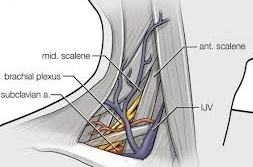Symptoms and Treatment of Brachial Plexus:
The Brachial Plexus lies in the posterior triangle of the neck between the muscles scalenius anterior and scalenius medius. At the root of the neck the plexus lies behind the clavicle. The plexus itself gives off several important branches:
- Nerve to rhomboids
- Long Thoracic nerve to serratus ant.
- Pectoral nerves to pectoralis major.
- Suprascapular nerve to supraspinatus infraspinatus.
In this rare disorder the brachial plexus, subclavian artery and subclavian vein may be compressed in the neck by contiguous structures such as a cervical rib or tight fibrous band.
Symptoms
Pain in the neck and shoulder with paraesthesia in the forearm, made worse by carrying a suitcase, shopping bag, etc.
Signs
1. Sensory loss in a T1 distribution.
2. Wasting and weakness of thenar and occasionally interosseous muscles.
3. Signs of vascular compression:
- Unilateral Raynaud’s phenomenon.
- Pallor of limb on elevation.
- Brittle trophic finger nails.
- Loss of radial pulse in arm on abduction and external rotation at the shoulder or on bracing the shoulders.
- Subclavian venous thrombosis may occur, especially after excessive usage of arm.
Investigation
- Coronal MRI is the definitive investigation.
- Plain radiology of the thoracic outlet may reveal a cervical rib or prolonged transverse process.
- Nerve conduction/electromyography will distinguish this from other peripheral nerve lesions.
- Arteriography or venography is occasionally necessary if there are obvious vascular problems.
Treatment
- In middle-aged people with poor posture and no evidence of abnormality on plain radiology, neck and postural exercises are helpful.
- In younger patients with clinical and electrophysiological changes supporting the radiological abnormalities, exploration and removal of a fibrous band or rib may afford relief.
Brachial plexus injuries are common in sport activities, but they frequently result from auto or slip and fall injuries or drops. Braner Pain Clinics specialize in chronic pain management, neurology, neurological testing and disability. Call now for best treatment: 1 (877) 573-1282

